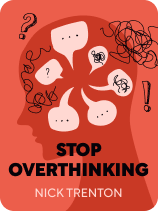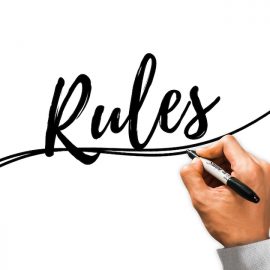

This article is an excerpt from the Shortform book guide to "Stop Overthinking" by Nick Trenton. Shortform has the world's best summaries and analyses of books you should be reading.
Like this article? Sign up for a free trial here.
How do you reduce overthinking? What are the best stress management strategies?
In Stop Overthinking, Nick Trenton outlines one approach to managing overthinking: coping more effectively with stress in your daily life. He breaks this approach down into three parts, advising you on how to deal with a stressful situation in the before, during, and after stages.
Continue reading to learn how to reduce overthinking to live a better life.
Stop Overthinking by Practicing Better Stress Management
You can learn how to reduce overthinking by developing healthier approaches to stress. While you can’t alter your genetics or your environment, you can change how you respond to challenging situations. Trenton offers various strategies to keep your anxiety in check before, during, and after you encounter something stressful.
(Shortform note: In The Upside of Stress, Kelly McGonigal recommends you embrace stress rather than try to avoid it. She argues that stress comes naturally when you pursue ambitions and personal growth. When you avoid things that stress you out, you’ll only create new problems. For example, if you ignore a work project until the last minute, you’ll only feel more stressed trying to complete it and also struggle to perform well in your job. Rather, McGonigal suggests developing a better stress mindset by remembering your strengths and past successes, connecting with others, and being vulnerable about your struggles.)
Before: Manage Your Time to Prevent Stress
Trenton explains that uncertainty can make you feel anxious. When you don’t have a plan for how to complete your daily or weekly tasks, you’re bound to feel higher levels of stress. He suggests you reduce your stress by identifying your top priorities, setting SMART goals, and being deliberate about how you spend your time.
Identify Top Priorities
Trenton argues that when you’re consciously aware of what you value in life, you can more easily let go of commitments that don’t fulfill you and instead make time for your priorities, which will reduce your stress. For example, you might determine that you value developing your small business plan, improving your health, and spending time with your kids. When you’re consciously aware of these priorities, it will be easier for you to reduce the time spent on other tasks.
Set SMART Goals
Eliminate the stress of meeting vague goals by creating ones that are SMART: specific, measurable, achievable, relevant, and time-based. For example, if your goal is to start a side business selling pet portraits, your expression of your SMART goal could be: “I want to sell ten pet portraits in the next month by spending two hours a day painting (specific, measurable, and time-based). I have the necessary supplies, painting experience, and interested followers (attainable), and this goal will help me improve my art skills and finances (relevant).”
When your goals are clear and focused, you’ll know exactly how to accomplish them and eliminate distractions.
Be Deliberate About How You Spend Your Time
Trenton also advises that you remove the stress of uncertainty by making deliberate choices about when you will accomplish each task. When you make these decisions up front, you’ll know exactly how to spend your time, leaving you less room to overthink.
To be deliberate in managing your time, Trenton suggests you do two things: 1) sort your tasks into categories of importance and urgency and 2) schedule your time around your priorities.
1) For each new task, first determine if it’s important or urgent. Important tasks move you toward your goals, whereas urgent ones have consequences for not completing them promptly. Then, address important and urgent tasks immediately, schedule important but not urgent tasks for another time, and delegate tasks that are urgent but not important. Finally, discard tasks that are neither so that you can focus on your priorities.
2) Block out specific chunks of time for each task throughout your day. Figure out when you’re most productive and plan to do your most important or difficult tasks then. Afterward, fill in the rest of your day with lower-priority work. This method prevents the urge to multitask and allows you to engage in more focused deep work.
During: Empower Yourself to Handle Stress
Although good time management habits can help prevent stress in your life, you won’t be able to avoid it entirely. When stress does happen, you can take a constructive approach to it and calm yourself through grounding practices.
Constructive Approaches to Stress
Instead of letting your anxious thoughts take over, try practicing four stress approaches to regain a sense of control:
Avoid the situation. Cut out unnecessary people or situations that cause you stress. For instance, if driving on the highway in heavy traffic makes you feel uncomfortable, try taking a local route or using public transportation.
Change the situation. When you can’t avoid a stressful situation, consider what you can change to reduce the stress. For example, if you’re struggling to concentrate on your work because of a construction project outside your building, purchase noise-canceling headphones. Also, people around you often aren’t aware of what’s bothering you about a situation. To change it, you often must speak out and express your needs and limitations. For example, if a friend needs to rant but you have a project due at the end of the day, respectfully communicate that you can’t hear them out right now.
Make peace with the situation. Sometimes, there’s nothing you can do to make a stressful situation better. Instead of worrying endlessly, acknowledge your feelings and make peace with the situation. For example, if your relative is in the hospital and you’re worried about their condition, acknowledge and accept that you feel concerned and understand there’s nothing you can do to alter the situation right now.
Adapt to the situation. Ease the stress of a challenging situation by changing your expectations. For example, if you’re frustrated because a project didn’t turn out the way you envisioned, reduce your stress by practicing forgiveness toward yourself and identifying what you learned from the experience.
Grounding Practices for Stress
You’ve learned the four approaches to managing stress, but what if you still feel anxiety bubbling up? Trenton suggests you distract yourself from racing thoughts by engaging your five senses. This keeps your brain occupied and grounded in the present moment so that you don’t drift into overthinking. To ground yourself with your five senses:
- Look at five things in your surroundings. For example, look at the sky and observe the texture of the clouds or how fast they’re drifting.
- Touch four things around you. Run your fingers across your desk or stroke your pet.
- Listen for three sounds. Pay attention to the sound of your breath or the hum of your air conditioner.
- Try to detect two smells. Observe the scent of your coffee or your clothes.
- Tune into one thing you can taste. You might notice the lingering taste of your breakfast.
After: Reflect on Your Thoughts and Feelings to Cope With Stress
Trenton also advises that after a stressful event, you can prepare yourself to better manage future stress by acknowledging and reflecting upon your stressful experiences. Ignoring your stress won’t make it go away. However, if you instead work through it constructively, you’ll gain more awareness about your emotions and what triggers your anxiety so that you can better approach similar situations in the future.
Trenton’s recommendations for reflecting on stress draw from the practice of cognitive behavioral therapy (CBT). This is a form of psychological treatment based on the theory that changing your thoughts can improve how you see the world and yourself. To reflect upon your thoughts and cope with stress, Trenton recommends you journal about your anxious thoughts and explore your feelings about it with curiosity.
Journal About the Stressful Event
To manage stress, Trenton suggests you work through it by writing in a journal. When you ignore your anxious thoughts and feelings, you’ll struggle to understand what causes them. However, by writing them down in a journal, you can productively process your emotions, understand what triggers them, and glean insights on how you can better cope with stress in the future.
Trenton recommends a research-backed approach to journaling about your stress: Start by recounting the stressful situation and describing the thoughts and feelings you had in that moment. Consider using a rating scale for your stress levels and try to notice any patterns of what’s most frequently causing you stress. Then, shift your focus to extracting something positive from the situation.
For example, if you argued with your partner about who will drive the kids to school after a miscommunication, you might record feeling frustrated that your partner didn’t express their time conflict beforehand and rate your stress as 7/10. Then, try to transition your focus to something good, such as being grateful that neither of you raised your voice in front of the kids.
Be Curious About the Stressful Event
Another way to process stressful events is to be open-minded and curious about your response to them. Instead of judging your thoughts and emotions, simply observe them. When you focus on being curious, you’re less likely to get caught up in feeling bad about yourself and how you reacted, which improves your ability to cope with stress.
To be curious rather than judgmental about your thoughts and emotions, Trenton argues you must first separate your personal identity from your problems—such as your tendency to overthink. Rather than trying to fix yourself, think about it as finding solutions to external problems that you’re just experiencing. When you distance yourself from your problems, you gain a sense of control and open yourself to new perspectives that can help you solve them.
Trenton suggests you use mantras and visualization to detach from your thoughts and emotions. A mantra is a statement you can repeat as a reminder to, for instance, distance yourself from your problems—“This problem doesn’t define me.” Visualization allows you to practice putting distance between yourself and your problems through your imagination. For example, imagine putting your stressful thoughts in a bottle and sending them out to sea.
You can even distance yourself from your anxious thoughts by personifying them or by seeing the humor in a situation. When you personify your thoughts, you give them a form outside of yourself, which allows you to analyze them with curiosity. One way Trenton suggests you do this is by imagining your anxious thoughts as a chatty friend trying to tell you a story. You can also personify your thoughts by giving them a silly name. For example, if you’re feeling guilty about a past mistake you made at work, give that moment a name like, “The Old Work Chronicle.”
Finding humor allows you to distance yourself by creating a new perspective on the situation that puts you in control. For example, if you’re embarrassed because a teacher called on you during class and you didn’t have the answer, picture what you must have looked like at that moment—perhaps like a character from your favorite cartoon caught in headlights.

———End of Preview———
Like what you just read? Read the rest of the world's best book summary and analysis of Nick Trenton's "Stop Overthinking" at Shortform.
Here's what you'll find in our full Stop Overthinking summary:
- What overthinking is and how it’s connected to stress and anxiety
- Ways you can manage stress before, during, and after it happens
- How to conquer your habit of overthinking with long-term solutions






